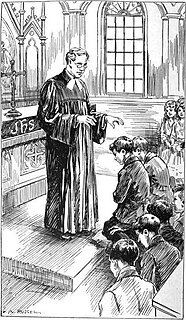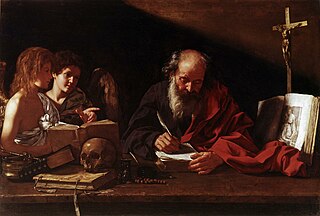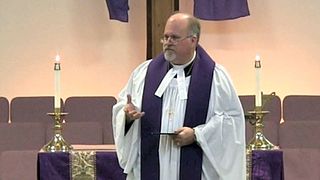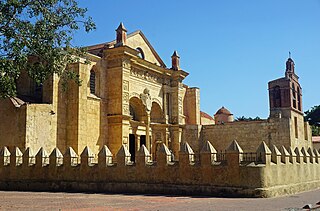| Look up Holy Spirit in Wiktionary, the free dictionary. |
Holy Spirit is an aspect of God in Abrahamic religions.
Contents
- Religion
- Religious orders
- Places of worship
- Schools
- Other religious institutions
- Other uses
- See also
Holy Spirit may refer to:
| Look up Holy Spirit in Wiktionary, the free dictionary. |
Holy Spirit is an aspect of God in Abrahamic religions.
Holy Spirit may refer to:
Holy Spirit may also refer to:
| This disambiguation page lists articles associated with the title Holy Spirit. If an internal link led you here, you may wish to change the link to point directly to the intended article. |
Born again, or to experience the new birth, is a phrase, particularly in evangelicalism, that refers to "spiritual rebirth", or a regeneration of the human spirit from the Holy Spirit, contrasted with physical birth.

Christianity is an Abrahamic monotheistic religion based on the life and teachings of Jesus of Nazareth. Its adherents, known as Christians, believe that Jesus is the Christ, whose coming as the messiah was prophesied in the Hebrew Bible, called the Old Testament in Christianity, and chronicled in the New Testament. It is the world's largest religion, with about 2.3 billion followers as of 2015.

The Eastern Orthodox Church, officially the Orthodox Catholic Church, is the second-largest Christian church, with approximately 220 million baptised members. It operates as a communion of autocephalous churches, each governed by its bishops in local synods. Roughly half of Eastern Orthodox Christians live in Russia. The church has no central doctrinal or governmental authority analogous to the bishop of Rome, but the Ecumenical Patriarch of Constantinople is recognised by all as primus inter pares of the bishops. As one of the oldest surviving religious institutions in the world, the Eastern Orthodox Church has played a prominent role in the history and culture of Eastern and Southeastern Europe, the Caucasus, and the Near East.
In Abrahamic religions, the Holy Spirit is an aspect or agent of God, by means of which God communicate with people or act on them.

In Christian denominations that practice infant baptism, confirmation is seen as the sealing of Christianity created in baptism. Those being confirmed are known as confirmands. In some denominations, such as the Anglican Communion and Methodist Churches, confirmation bestows full membership in a local congregation upon the recipient. In others, such as the Roman Catholic Church, confirmation "renders the bond with the Church more perfect", because, while a baptized person is already a member, "reception of the sacrament of Confirmation is necessary for the completion of baptismal grace".

A hermit, or eremite, is a person who lives in seclusion from society, usually for religious reasons. Hermits are a part of several sections of Christianity, and the concept is found in other religions as well.

Christian Church is a Protestant ecclesiological term referring to the church invisible comprising all Christians, used since the Protestant Reformation in the 16th century. In this understanding, "Christian Church" does not refer to a particular Christian denomination but to the "body" or "group" of believers, both defined in various ways. A prominent example of this is the branch theory maintained by some Anglicans. This is in contrast to the one true church applied to a specific concrete Christian institution, a majority Christian ecclesiological position maintained by the Catholic Church, the Eastern Orthodox Church, the Oriental Orthodox churches, Assyrian Church of the East and the Ancient Church of the East.

Whit Monday or Pentecost Monday is the holiday celebrated the day after Pentecost, a moveable feast in the Christian calendar. It is moveable because it is determined by the date of Easter. In the Catholic Church, it is the Memorial of the Blessed Virgin Mary, Mother of the Church.

The Catholic Church, sometimes referred to as the Roman Catholic Church, is the largest Christian church, with approximately 1.3 billion baptised Catholics worldwide as of 2018. As the world's oldest and largest continuously functioning international institution, it has played a prominent role in the history and development of Western civilization. The church is headed by the bishop of Rome, known as the pope. Its central administration is the Holy See.

The novitiate, also called the noviciate, is the period of training and preparation that a Christian novice monastic, apostolic, or member of a religious order undergoes prior to taking vows in order to discern whether they are called to vowed religious life. It often includes times of intense study, prayer, living in community, studying the vowed life, deepening one's relationship with God, and deepening one's self-awareness. It is a time of creating a new way of being in the world. The canonical time of the novitiate is one year; in case of additional length, it must not be extended over two years. This time is both for the novice to get to know the community and the community to get to know the novice's charisms and ability to live a religious life. The novice could deepen their relationship with God, intensify the living out of the community's mission and charism, and foster their human growth. The novitiate in many communities includes a concentrated program of prayer, study, reflection and limited ministerial engagement.

In Christianity, a minister is a person authorized by a church or other religious organization to perform functions such as teaching of beliefs; leading services such as weddings, baptisms or funerals; or otherwise providing spiritual guidance to the community. The term is taken from Latin minister, which itself was derived from minus ("less").
The Church of the Holy Sepulchre is a church in the Christian Quarter of the Old City of Jerusalem, believed to be the site of Jesus's empty tomb.
The rule of faith is the name given to the ultimate authority or standard in religious belief. It was used by Early Christian writers such as Tertullian. The phrase is sometimes used for early creeds.
Consecrated life is a state of life in the Catholic Church lived by believers who wish to follow Jesus Christ in a more exacting way. According to the Catechism of the Catholic Church, it "is characterized by the public profession of the evangelical counsels of poverty, chastity, and obedience, in a stable state of life recognized by the Church". The Code of Canon Law defines it as "a stable form of living by which the faithful, following Christ more closely under the action of the Holy Spirit, are totally dedicated to God who is loved most of all, so that, having been dedicated by a new and special title to his honour, to the building up of the Church, and to the salvation of the world, they strive for the perfection of charity in the service of the kingdom of God and, having been made an outstanding sign in the Church, foretell the heavenly glory."

Christianity is the most widely professed religion in the Dominican Republic. Historically, Catholicism dominated the religious practices of the country, and as the official state religion it receives financial support from the government. In modern times Protestant and non-Christian groups, such as Muslims and Jews, have experienced a population boom.

Raniero Cantalamessa is an Italian Catholic priest in the Order of Friars Minor Capuchin and theologian. He has served as the Preacher to the Papal Household since 1980, under Pope John Paul II, Pope Benedict XVI and Pope Francis.

The following outline is provided as an overview of and topical guide to the Catholic Church: